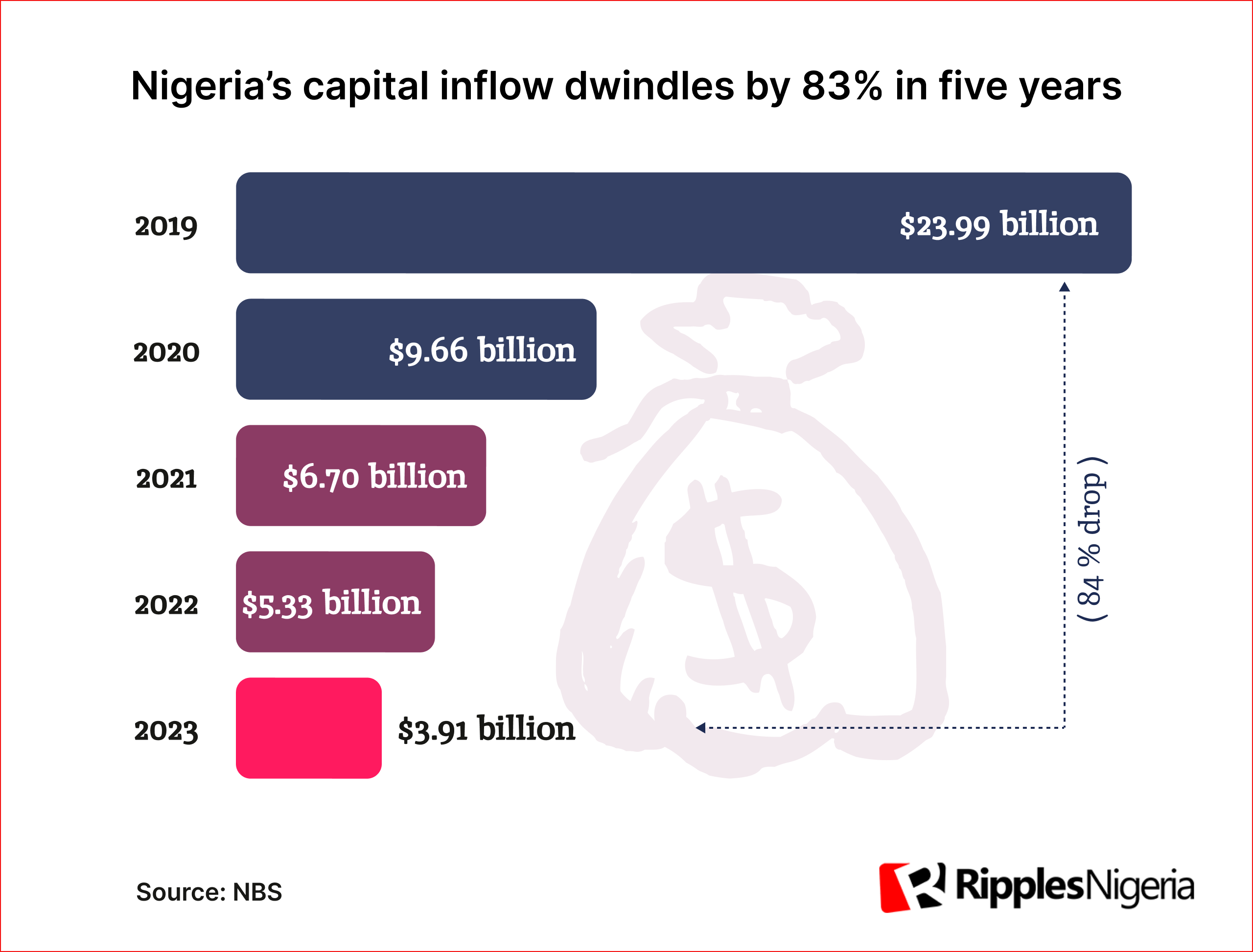Ripples Metrics
RipplesMetrics: Nigeria’s capital inflow dwindles by 84% in five years

The Minister of Industry, Trade and Investment, Doris Anite, recently disclosed that the federal government, secured investment commitments worth $30 billion from foreign investors since it assumed office eight months ago.
Anite noted that the investments were tied to the visit made by President Bola Tinubu to India and other investors in the oil and gas sector. According to her, the economic policies by the president, such as the removal of fuel subsidies and devaluation of the naira at the exchange market, have contributed to increasing foreign investment in the country.
She said, “Since then, we have seen the Confederation of Indian Industries visiting Nigeria to explore identified investment opportunities further. These engagements with India, Germany, Netherlands, UAE, South Africa, and others have opened up avenues for investment and the establishment of joint regulatory protocols”,
However, latest data gathered by RippleMetrics shows that Nigeria’s capital importation has dropped to its lowest by more than 83.7 per cent in the last five years.
This means that what Nigeria pulled in as capital inflow for 2023 is six times lower than what was generated in 2019. In 2023, Nigeria pulled a total capital inflow of $3.91 billion as against what it generated in 2019, which was $23.99 billion.
In economics, capital inflow is the amount of capital coming into a country, for example in the form of foreign investment.
Data, however, showed that within the last five years, Nigeria’s foreign investment reduced consecutively. This drop could be connected to several monetary and economic policies enacted by both the former president, Muhammadu Buhari and Tinubu, who assumed office on May 29, 2023.
READ ALSO:RipplesMetrics: Nigeria’s states received N3.53 trillion as FAAC in 2023
This would mean that the data negated the assertion by the Minister of Industry, Trade and Investment that the policies of the new president attracted more investments.
Importation by countries
Further findings by RipplesMetics showed that just as capital importation dropped over the years, the number of investments from foreign countries also declined.
In 2019, the country generated $23.99 billion from 73 countries as capital importation. Major investments came from countries like the United Kingdom, the United States, South Africa, Singapore and the United Arab Emirates.
The following year, 2020, the capital inflow dropped to $9.66 billion with just 66 foreign countries pulling the investment with countries like the United Kingdom, South Africa and the Netherlands bringing in the highest investments.
Meanwhile, only 52 countries generated a total of $ 6.70 billion foreign inflow in 2021, while in 2022, 53 countries were responsible for the $5.33 billion inflow generated.
For 2023, the import by foreign countries dropped to 47 with a total import of $3.91 billion inflow generated.
RipplesNigeria has reported how the UK, Mauritius, Netherlands, and Singapore topped Nigeria’s source of capital importation in the fourth quarter of 2023. Another report by RipplesMetrics showed how the United Kingdom dominated Nigeria’s capital inflow in four years.
By Jame Odunayo
Join the conversation
Support Ripples Nigeria, hold up solutions journalism
Balanced, fearless journalism driven by data comes at huge financial costs.
As a media platform, we hold leadership accountable and will not trade the right to press freedom and free speech for a piece of cake.
If you like what we do, and are ready to uphold solutions journalism, kindly donate to the Ripples Nigeria cause.
Your support would help to ensure that citizens and institutions continue to have free access to credible and reliable information for societal development.












